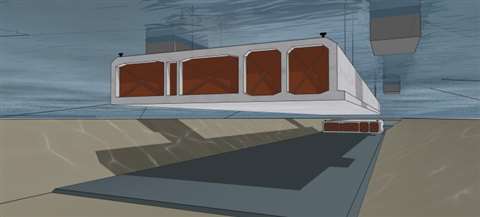Funding green light for Fehmarnbelt tunnel
01 May 2020
Work on the construction phase of the €7.4 billion Fehmarnbelt project, connecting Denmark and Germany, will commence in January 2021, according to the developer, Femern A/S.
The 18km road and rail link – set to be the world’s longest undersea tunnel – will stretch across the Bay of Kiel, between the German island of Fehmarn and the Danish island of Lolland.
In March, the European Commission (EC) approved the financing for the project, allowing Femern to activate the main construction contracts with the Femern Link Contractors (FLC).
The harbour at Rødbyhavn has been under construction since November 2019, with completion expected by the end of 2021. The harbour will act as a gateway to a vast manufacturing facility that will supply the concrete elements for the tunnel itself.
According to Femern, the factory will be roughly equal to 200 football fields in area, making it one of the largest of its kind in Northern Europe.

Once commissioned, the factory will begin producing the tunnel elements.
At that point, in a feat of engineering, the first of 89 concrete tunnel elements (each weighing some 73,000 tonnes) will be towed into position by four tugs, before being lowered into a dredged trench on the seabed (at a maximum depth of 30m).
Each will be fitted with a watertight steel bulkhead, keeping the interior dry and aiding its floatation.
The tunnel contractors will use GPS, echo sounding, ballast tanks, cables and winches to guide the elements into position.
Once seated in the trench, the tunnel elements will have concrete poured into cavities at the bottom of their road and rail tubes, to a depth of approximately 1m. The ballast will keep them in position on the seabed.
Following the funding approval, Femern’s CEO Claus Baunkjær said, “This is truly a great day for the Fehmarn tunnel project. The main stages of the construction phase will now commence”.
See a video animation of the Fehmarnbelt construction process here.

